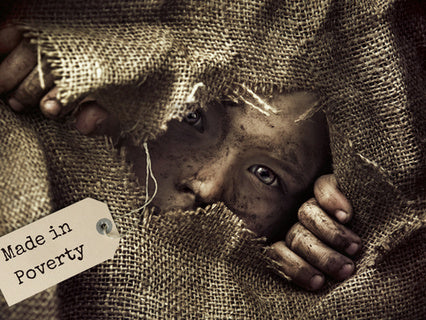
Rule Break #2 - Business is business and sometimes people get hurt.
Sigh.
Why does this persist in business? Why are so many people willing to exploit anything and anyone in order to make some more money?
I, for one, am over it. I'm sure you are too.
No label should read “Made in Poverty” or “Made in Slavery”.


Business needs to be holistic; a-people-first, this-is-how-we-treat-humanity, this-how-we-treat-our-planet, badass-leadership kind of vibe.
When we first started, our plan was to simply give 20% of our profits away to foundations who were crushing their mission.
Everything shifted when our founder, Carlie Rioux, went to a retreat for Social Enterprises in Banff, Alberta and had a colleague sit her down:
"Listen, I don't believe you. I don't believe all you can do is give away profits. I think you can do more. More good. More impact. Just more."
He challenged her and it was bloody uncomfortable.
However, he was utterly and completely correct. Carlie came home and revamped our entire business model in the span of 3 weeks.
We now champion ethical practices throughout our entire chain, and help other businesses do the same through mentorship. We comb through every piece of our business from our artists to our packaging regularly to ensure we are having the maximum impact we can.
It's vital to shed light on how business can help heal the world and how our everyday buying decisions impact other people's realities.
20 million people are trapped in forced-labor situations[1], with fashion being one of the worst offenders. Economic crises, sudden job loss, and poverty are the leading causes of human trafficking[2].
We aim to help change these horrific statistics by partnering with ethical manufacturers to provide sustainable work in communities that are most at risk.
By using a model of providing safe work instead of only giving charity, we aim to help people rebuild their lives after being exploited or marginalized. We want them to experience autonomy, freedom and choice. That's where their personal power can flourish.

Tip: Use your dollars to vote for the type of world you want to live in. By digging into a company just a little bit, you'll be able to spot who is working on our big social issues. The more we support ethical businesses, the more pressure we put on the bigger brands to STOP exploiting people and the planet for their gains and to get on board for the new way to Do Good Business.
Things to do to spot companies that are Doing Good Business:
- See if they tell you where their products are manufactured (or outright tell you which factory they are partnered with).
- Read the Brand's about us or story page, you'll get a sense for what they are really about.
- Stalk their social media and see what they often talk about.
- Look for certifications. (You can also cross reference this by going to the certification website and seeing if that brand is mentioned)
- When in doubt - ask the brand. If they are legit, they will get back to you.
In the comments below, drop a shout out to your favorite ethical brands! Let's spread the word and help other people find companies that are doing good shit.
xx Thea
[1] https://www.stopthetraffik.org/about-human-trafficking/the-scale-of-human-trafficking/
[2] International Labour Organization and Walk Free Foundation: Global Estimates of Modern Slavery: Forced Labor and Forced Marriage, 2017 (Geneva Report), 49 (https://migrationdataportal.org/themes/human-trafficking)
